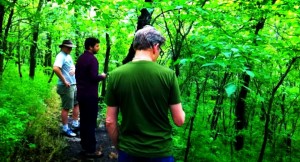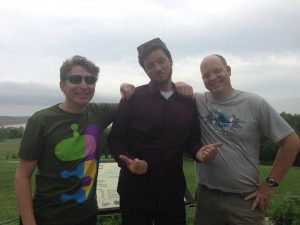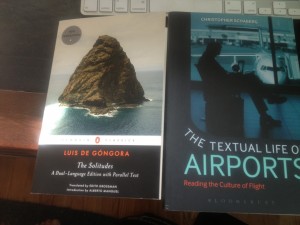Look at that green! Surrounding, confining, holding us in. It was beautiful, with the wet lush soggy brilliance that follows two days of violent storms. We’d been thunderstormed out of plans to go kayaking on the mighty Kansas River and had ended up in Clinton State Park, where we wandered around on muddy trails looking for the way down to the lake’s shore. Eileen’s Cole Haan shoes transformed themselves into muddy skis, gliding downhill. In this picture, you can see me and Lowell staring perplexed into the green labyrinth, and Jeffrey sagely consulting the i-Gods.
Since all images are allegories, I think this picture captures the challenge of moving beyond the green, and the aesthetic pleasures of being surrounded.
My first trip to ASLE had something of the disorienting beauty of this woodscape, but also many more simple pleasures. I’ve seldom been to a happier academic gathering, which seems odd given the fairly constant anxiety about eco-crisis. Perhaps it was the infectious high spirits of Serenella Iovino and Serpil Opperman, international eco-thinkers who I met for the first time in Lawrence, or the great food & drink in the fun college town, or finally meeting Stacy Alaimo and Simon Estok and Chris Schaberg, or hearing Cary Wolfe on biopolitics for the second time in a month, or closing yet another set of bars with Lowell, Jeffrey, and Eileen — but in all ways, it was great fun.
On Thursday morning I woke before dawn in coastal Connecticut and somehow made it 1500 miles west to Stacy’s plenary at 10:30 am in the Kansas University Memorial Union. Arguably that place-erasing speed, my pre-dawn itinerary of planes, automobiles, and internal combustion engines, represents an ecological problem. But it was great to get there and think about the eco-poetics Stacy’s finding in submarine depths.
The questions after Stacy’s plenary, which she shared with Cary, were hard to follow. That would become an ASLE pattern. Also a sign of interdisciplinarity?
In a conference filled with questions, I remember the most succinct. At the “Building the Environmental Humanities” roundtable the next morning, it was about the difference between the sciences and the humanities. “They build things, we ask questions.” The panelists didn’t accept that characterization of the “two cultures,” and nether do it. But I do think that there are meaningful distinctions between the sciences and humanities, which make interdisciplinary alliances both productive and challenging. So maybe it’s worth seeking a better way to describe that difference, one that employs a richer understanding of “materiality,” one of the obsessions of at least my strain of this ASLE. We don’t need to flatter the physical sciences by paying homage to direct forces or financial investments, nor conversely to imply that questioning humanists are somehow uncorrupted by modern institutions, economics, and power dynamics. “They” ask lots of questions, and “we” build plenty of things. Might this be a better way to phrase it: “They build models, and we tell stories”? Which perhaps begs the question of what the difference is between testable models and persuasive stories. I’m a narrative-monger myself, though I understand the value of testable models. Perhaps the we/they syntax is too problematic?
I also came away with a perhaps cynical historicizing question: has it ever not been true, at least subjectively true, to say that “Now more than ever…we live in crucial times”? What other times might anyone ever live in? Part of the issue with multiple time scales — human, geological, ecological — remains our difficulty in escaping mortal or perspectival boundedness. Maybe that’s not a problem, more of a condition of embodied thinking, which means that whenever we invoke time scales they are always plural, always adding to what we are already experiencing. Times of the self, the fiction, the scholarly talk, the glacier, the rock, the hummingbird, the river, the thunderstorm…
ASLE was the final lap of the five-part conference relay I’ve been running since late March, and I must say I’m exhausted, ready for a slower-moving summer and the shipwreck project. Conferences are, at their best, productive entanglements, which means (in an eco-sense) that they enable new networks, products, processes. Now it’s time to put those networks to work!



I’ve seldom been to a happier academic gathering, which seems odd given the fairly constant anxiety about eco-crisis.
I think there’s something very hopeful about gathering with like-minded folks and seeing just how many good people there are out there fighting these battles. ASLE conferences are always great fun, no matter how difficult the environmental crisis, and always leave me feeling refreshed and inspired.
Thanks for this Steve. Entanglement is just the word here — and sometimes unsatisfied desires for entanglements (I went to some great sessions, but also to some that left me feeling unable to connect; some of the Q&A, as you note, was like that as well). All in Ll though it was a great conference, especially when post panel discussion was fueled by maple old fashioneds.
Maple old fashioneds + Alabama biscuits + Lake Michigan’s waters + Bob Dylan + craft beer from Ontario…one of these springs, we’ll get all this stuff just right!
I agree about an odd mix of instantly happy entanglements & some sessions that didn’t show any clear ways in. But perhaps that’s often the way of new communities.